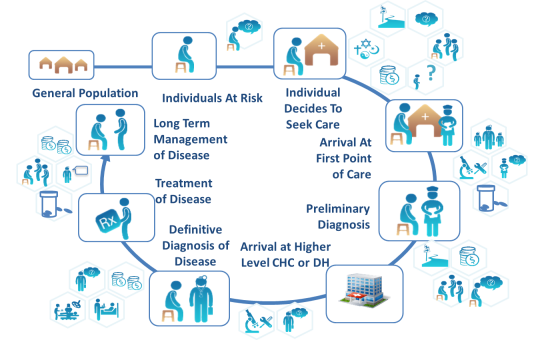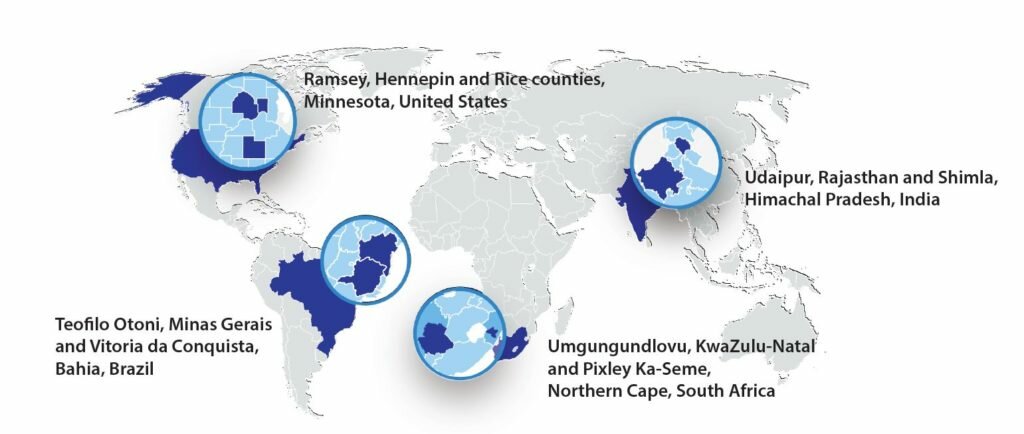About HealthRise
HealthRise is a five-year, $17 million global effort funded by the Medtronic Foundation designed to expand access to care for cardiovascular disease (CVD) and diabetes among underserved populations in targeted geographies in Brazil, India, South Africa and the United States. HealthRise aims to contribute to the World Health Organization’s goal of reducing premature mortality associated with chronic, non-communicable diseases (NCDs) by 25% by 2025 through the implementation and evaluation of innovative, sustainable and scalable community-based demonstration projects. These projects empower patients, strengthen frontline health workers, and advance policies to increase the detection, management and control of CVD and diabetes and enable people living with chronic diseases to successfully manage their condition over the long term.
Figure 1 depicts the objectives and primary approaches to reach this goal.

Figure 1: HealthRise Goals and Objectives
“We know that global change in healthcare access begins on the frontlines of villages, towns and cities all around the world,” said Jacob A. Gayle, Ph.D., Vice President of the Medtronic Foundation. “We expect that, by convening experts and making resources more readily available, we will help fill a real need in the effort to strengthen health systems so that people at risk for, or living with a chronic disease, can live longer, higher-quality lives.”
HealthRise is guided by the Medtronic Foundation’s holistic view of existing healthcare systems and the barriers that interrupt the continuum of care. Thus, in all four countries, HealthRise is aligned with the Medtronic Foundation’s Continuum of Care (CoC) model (Figure 2), which provides a framework for the delivery of optimum health care to patient populations that is evidence-based, comprehensive, and patient-centered.

Figure 2: Continuum of Care Model
The CoC maps the pathway of an integrated system of care that guides and tracks patients over time through a comprehensive array of health services spanning all levels of intensity of care. HealthRise uses this framework as a guide to engage multi-sector stakeholders in the design of innovative demonstration projects that ensure end-to-end solutions for patients and health systems. HealthRise programs aim to drive change through a comprehensive understanding of each community’s unique health system, and commitment to strengthen that system throughout the continuum of care. This includes working with patients, frontline healthcare providers and policy makers to clarify the distinct social, economic and health impact that NCDs have on the people living with them, and leveraging existing resources and opportunities to advance policies and enhance resources to better support them and their families.
Geographies
Both global and local in nature, HealthRise focuses its efforts in select communities in the following geographies:

The HealthRise Approach: Extending Care into Communities and Homes
HealthRise is strengthening health care delivery in the community and extending care into home-based settings to improve health outcomes for underserved populations. Interventions conducted by HealthRise grantee partners include:
- Leveraging mobile app technology to improve communication between patients and providers.
- Establishing patient support groups and caregiver/family member groups to encourage treatment adherence.
- Building and strengthening coordinated care teams, integrating both community paramedics and community health workers as part of service provision, to holistically address patient needs and barriers.
- Conducting screenings in grocery stores and other locations within the community.
- Training community health workers to provide home-based chronic care.
The Global Burden of Chronic Disease
- Chronic NCDs such as diabetes and CVD account for more deaths globally than any other cause and total 75% of healthcare costs.
- Worldwide, more than 100,000 people die from an NCD every day.
- A disproportionate toll is taken on those who cannot afford care, cannot physically access care, or have limited knowledge of their condition, their local health care system, or their rights as patients.




